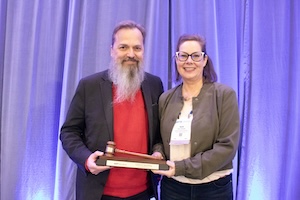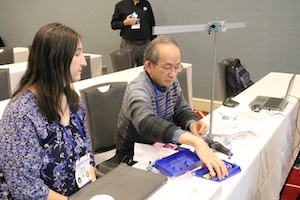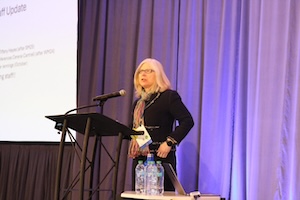 2025 Winter Meeting Highlights
2025 Winter Meeting Highlights
Statistics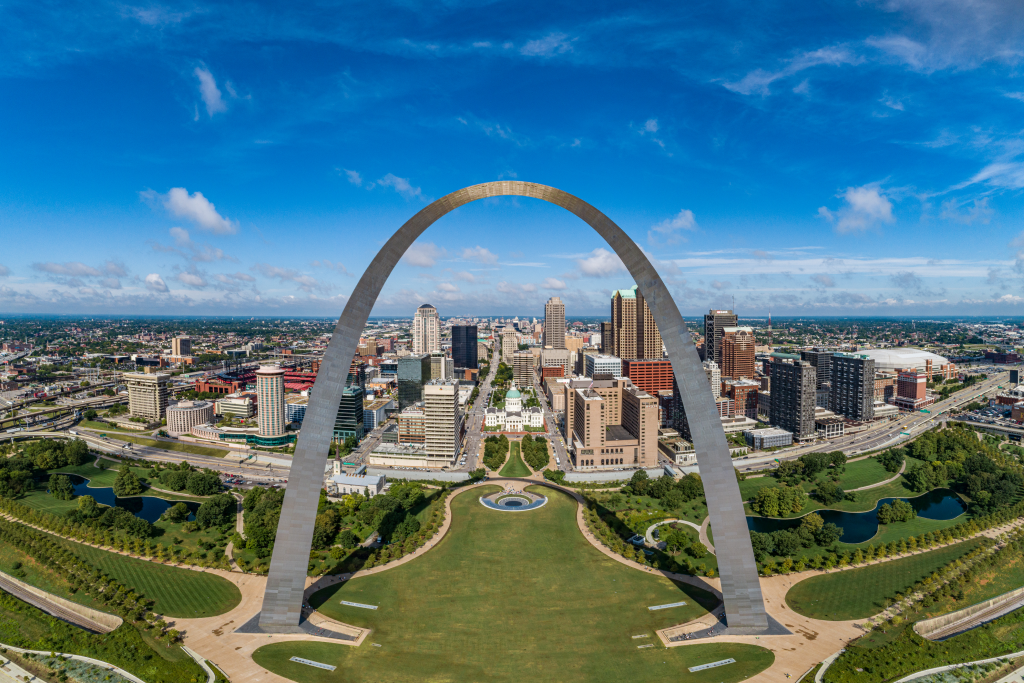
Attendees: 394
Exhibitors: 8
Sessions: 60
Workshops: 8
Commercial Workshops: 4
Posters Presentations: 66
Program Committee Chair: Gabriel C. Spalding
The Annual Meeting Planning 2025 (AMP25) team : Debbie Andres, Brad Conrad, Anne Cox, Dan Crowe, Jonathan Perry, and Gordon Ramsey
Know as the Gateway to the West, Saint Louis, welcomed physics educators from around the world who explored gateways to the future and the world of Quantum physics.
Attendees also enjoyed a variety of social opportunities such as the First Timers' Gathering,Welcome Reception, SPS Awards, and Teacher Share-a-Thon.

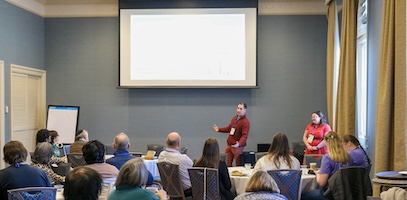
Meeting of the Members
The 2025 AAPT Meeting of Members gave attendees the opportunity to learn about the governance and activities of their association. Secretary Blaine Baker reported on the results of the 2024 AAPT National Election and the Nominating Committee for 2025. The Chair of the Section Representatives, Sam Sampere shared information regarding the activities of the sections and the AAPT Treasurer, Jim Freerick’s reported on the financial position of the association. Executive Officer, Beth Cunningham and President Kelli Warble presented information on the status of AAPT programs.
Time during the meeting was devoted to honor the memory of prominent AAPT members who died during 2024: Harvey S. Leff (AAPT President 2007), Mary Myers Winn, Paul Stoksted, David Terry Kagan, Edward F. (Joe) Redish, Stephanie Chasteen, Mary Mogge (AAPT President 2015), Alan Van Heuvelen, Daniel Smith, and Amber Stuver.
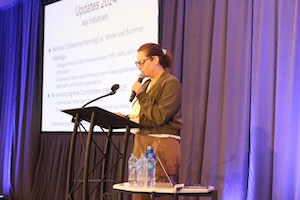
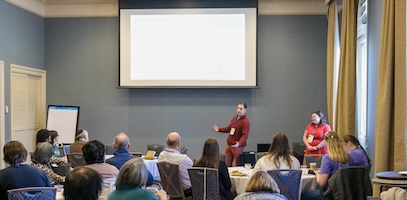
Program
Sessions, sponsored by AAPT Committees, comprised the bulk of the educational content for the program. Sessions addressed:
Ready, Set, Teach: Strategies for Your Physics Classroom
Innovations in Assessment
Using AI in the Classroom
Citizen Science in the K-12 Physics Classroom
Interactive: Opening Up Demonstrations and Pathways in Physics
Interactive: Enhancing Student Engagement
Innovations in Course Design
Frontiers in Space Science and Astronomy
Interactive: Implementing NGSS-based Practices in Physics Classrooms
Beyond Intro
PER: Student Success
Celebrating the International Year of Quantum Physics with AJP and TPT
Analysis of AP Physics Student Performance on Multiple-Choice Questions
Interactive: STEP UP! Your Physics Classroom
Vertical Articulation from K-8 to HS with the NGSS Science Practices
Quantum Education Promotion (QEP): Initiatives and Challenges in Undergraduate Programs
PER: Science and Math
Embracing the Dark Side: Teaching Light Pollution Concepts to K-16
PTRA Presents Make, Take, Learn, Do
AP Physics: Revised Course and Exams for 2024-2025
Frontiers of Quantum Research 1: Quantum Sensing and Measurement
Supporting Students and Faculty: TYCs
PICUP: Ideas for Integrating Computation into Physics Courses
AI in Physics Education
Women+ and Gender Minorities in Physics: A Roundtable Discussion
Teaching the Introductory Physics for Life Sciences (IPLS) Course
Frontiers of Quantum Research 2: Quantum Materials
Culture-based Approaches to Physics Education
PICUP: Integrating Computation and Experiment
21st Century Physics and Astronomy in the Classroom
Interactive (e.g. panel, round table discussion, hands-on activity) | Beyond the Textbook: Redefining Physics with AR/VR Adventures
Innovation in the Physics Classroom
PICUP: Integrating Computation in Upper-Level Courses
Labs/Apparatus
Interactive: Visualizations in the Physics Classroom
Physics with Phones – Magnetism
Plenary
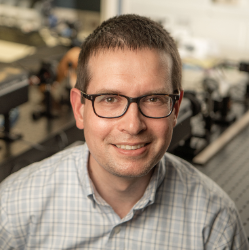 Ben Zwickl is an Associate Professor in the School of Physics and Astronomy and a member of the Physics Education Research Group at Rochester Institute of Technology. He is also an Adjunct Professor at the Center for Computing in Science Education at the University of Oslo. He received a PhD in physics doing experiments related to quantum optomechanical sensors, which was followed by a postdoc in physics education research at the University of Colorado Boulder. Since that time, Ben has pursued research on the nature of physics expertise, how expertise is developed, and the relationship between formal education and professional success. This has included research on graduate education, career preparation for optics and quantum jobs, and laboratory education. Ben regularly teaches courses that integrate computation, laboratory work, and projects. Zwickl’s talk was on Preparing students for a quantum future.
Ben Zwickl is an Associate Professor in the School of Physics and Astronomy and a member of the Physics Education Research Group at Rochester Institute of Technology. He is also an Adjunct Professor at the Center for Computing in Science Education at the University of Oslo. He received a PhD in physics doing experiments related to quantum optomechanical sensors, which was followed by a postdoc in physics education research at the University of Colorado Boulder. Since that time, Ben has pursued research on the nature of physics expertise, how expertise is developed, and the relationship between formal education and professional success. This has included research on graduate education, career preparation for optics and quantum jobs, and laboratory education. Ben regularly teaches courses that integrate computation, laboratory work, and projects. Zwickl’s talk was on Preparing students for a quantum future.
Awards
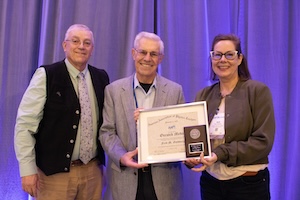 The 2025 Hans Christian Oersted Medal was presented to Fred Goldberg, Emeritus Professor of Physics at San Diego State University, where he has been involved in research, curriculum development, and teacher professional development in physics education, working with students and teachers throughout the entire educational spectrum, K-16. In his talk, Facilitators in an online faculty learning community: How their goals and roles evolve, and how they gain value through participation he reflected on his long career in physics education working on many curriculum development projects, elementary through college, and within those contexts he studied student learning, supported faculty implementers and studied their professional growth. Most recently he worked on Next Generation Physical Science and Everyday Thinking (NGP), a guided-inquiry curriculum designed for prospective elementary teachers. Because the pedagogy emphasizes student involvement in the collaborative development of evidence-based ideas, the instructor needs to assume a role quite different from traditional lecture-based instruction. We developed the NGP Faculty Online Learning Community in 2017 to help support instructors in this new role. Initially the community consisted of about 50 faculty members divided into groups of 8-12, who met bi-weekly over zoom. Each group was led by two facilitators, chosen because of their prior experience with the curriculum pedagogy. In this talk he described two research projects that were part of a wider project research agenda to study the FOLC. In one project we studied how a facilitator’s goals and role evolved over multiple years as the needs of the faculty implementers changed. In the other, we studied social value creation in the community, and in part how a facilitator gained value through participation.
The 2025 Hans Christian Oersted Medal was presented to Fred Goldberg, Emeritus Professor of Physics at San Diego State University, where he has been involved in research, curriculum development, and teacher professional development in physics education, working with students and teachers throughout the entire educational spectrum, K-16. In his talk, Facilitators in an online faculty learning community: How their goals and roles evolve, and how they gain value through participation he reflected on his long career in physics education working on many curriculum development projects, elementary through college, and within those contexts he studied student learning, supported faculty implementers and studied their professional growth. Most recently he worked on Next Generation Physical Science and Everyday Thinking (NGP), a guided-inquiry curriculum designed for prospective elementary teachers. Because the pedagogy emphasizes student involvement in the collaborative development of evidence-based ideas, the instructor needs to assume a role quite different from traditional lecture-based instruction. We developed the NGP Faculty Online Learning Community in 2017 to help support instructors in this new role. Initially the community consisted of about 50 faculty members divided into groups of 8-12, who met bi-weekly over zoom. Each group was led by two facilitators, chosen because of their prior experience with the curriculum pedagogy. In this talk he described two research projects that were part of a wider project research agenda to study the FOLC. In one project we studied how a facilitator’s goals and role evolved over multiple years as the needs of the faculty implementers changed. In the other, we studied social value creation in the community, and in part how a facilitator gained value through participation.
Goldberg was the recipient of AAPT’s 2003 Robert A. Millikan Award. He was also a 2007 Fulbright Senior Specialist, visiting scholar to Israel and in 2014 he was elected as a Fellow of the American Association of Physics Teachers. His research and development efforts have focused in three main areas: (1) Developing activity-based physics and physical science curricula for preservice and in-service elementary teachers to be used in both small and large (lecture-style) classroom environments and investigating student learning in these environments; (2) studying university and college faculty implementing research-based curricula as part of a faculty online learning community; and (3) supporting responsive teaching in science in elementary and middle school classrooms.
His curricular work has resulted in publication of several one-semester courses that are used in colleges and universities nationwide: Physics and Everyday Thinking (PET), Physical Science and Everyday Thinking (PSET), and Learning Physical Science (a large-enrollment adaptation of PSET). Most recently, Next Generation PET is a curriculum that unites the previous versions of PET and PSET, and aligns with the Next Generation Science Standards. Work in the second area has resulted in the development of a website that supports teacher implementation of Next Generation PET, including video snippets of students engaged in small group and whole class discussions for almost all the activities in the curriculum. He has also helped develop a year-long activity-based middle school physical science curriculum, Interactions in Physical Science, and a set of professional development materials to support teachers’ implementation.
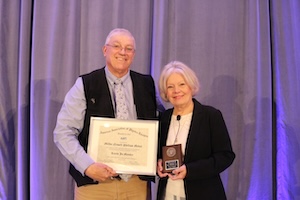
Matsler’s distinguished career spanning several decades, is marked by her leadership, advocacy, and dedication to advancing physics education. From her early days as a Physics Teaching Resource Agent (PTRA) in. 2000 to becoming the national director of the PTRA Program from 2012 to 2023, Matsler has been at the forefront of physics teacher professional development. She has served a three-year elected term on the AAPT Board of Directors, been appointed to several Committees and Advisory Boards, and organized countless workshops, presentations, and sessions at AAPT national meetings. Her contributions have been recognized through numerous awards, including the American Physical Society’s Excellence in Physics Education Award, the Homer Dodge Distinguished Service Citation in 2008, and as an AAPT Fellow in 2014.
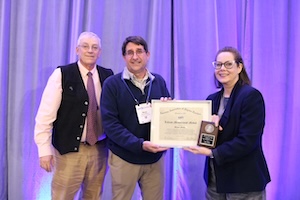
His enthusiasm for physics and physics education were apparent throughout his undergraduate career, including his senior year experience as a teaching assistant for the electronics laboratory and his thesis project on building a cloud chamber.
Mason recognized the potential of the internet early on working on behalf of MERLOT in 2000 as the physics editor, a position he held for about a decade, cataloging and organizing an extensive collection of physics software and curricular material. His talent as digital library innovator was recognized by the physics societies and he was recruited by the American Association of Physics Teachers (AAPT), the American Institute of Physics (AIP), and the American Astronomical Society (AAS) to lead the development of a multi-society National Science Digital Library (NSDL) known as ComPADRE gaining him an international reputation as a knowledgeable and skilled administrator/teacher. He was asked to serve as a member of the Board for the European Multimedia in Physics Teaching and Learning (MPTL) conference series. He was also asked to serve on the international organizing committee for Groupe International de Recherche sur l’Enseignement de la Physique (GIREP) conferences.
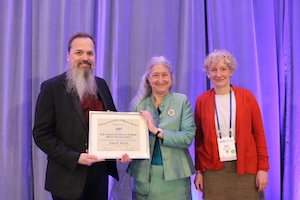
Throughout her distinguished career, McNeil has been a visible, ardent, knowledgeable, and successful advocate and practitioner for innovative and effective graduate physics education at Carolina and beyond. She has maintained her passion, energy, and excellence in graduate education, particularly through her leadership roles as Department Chair (2004-2009) and Director of Career and Professional Development (2022-present) for the Department of Physics and Astronomy at UNC-Chapel Hill, and Director of Graduate Studies (1995-1998) and Interim Chair (2007-2008) for the Curriculum of Applied and Materials Sciences (now Department of Applied Physical Sciences), all the while setting a very high standard in effective mentoring of PhD students, maintaining an active research program, improving diversity in the physics community (especially through her major role in the Climate for Women Site Visit Program of the American Physical Society), and championing excellence in undergraduate curriculum and pedagogy. She is recognized nationally and internationally for her work and has helped the University of North Carolina’s physics department and the University to be a leader in physics education.
Serving as the Director of Graduate Studies (DGS) for the Curriculum in Applied and Materials Sciences, McNeil worked with faculty from partnering programs, including Physics, Chemistry, Applied Math, and Dentistry, to design the graduate curriculum and get it approved by the UNC system.
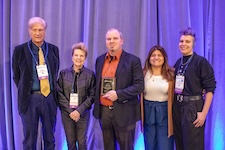 The 2025 recipient of the Doc Brown Futures Award is Jonathan Perry, Assistant Professor of Instruction, in the Department of Physics at the University of Texas Austin. His talk was, Investing in a Soul. Brown shared that of all the things he learned while earning a bachelor’s degree in physics, teaching wasn’t one of them. Despite the availability of knowledge about good teaching, his early classes incorporated embarrassingly little of it. But it got better. He shared how he use my early experiences to help others avoid similar pitfalls; from training undergraduate Learning Assistants and graduate Teaching Assistants to running faculty development. He focused on the development, implementation, and impact of mindset interventions cultivating students’ sense of belonging, growth, and/or purpose in physics courses from the introductory to the advanced graduate level.
The 2025 recipient of the Doc Brown Futures Award is Jonathan Perry, Assistant Professor of Instruction, in the Department of Physics at the University of Texas Austin. His talk was, Investing in a Soul. Brown shared that of all the things he learned while earning a bachelor’s degree in physics, teaching wasn’t one of them. Despite the availability of knowledge about good teaching, his early classes incorporated embarrassingly little of it. But it got better. He shared how he use my early experiences to help others avoid similar pitfalls; from training undergraduate Learning Assistants and graduate Teaching Assistants to running faculty development. He focused on the development, implementation, and impact of mindset interventions cultivating students’ sense of belonging, growth, and/or purpose in physics courses from the introductory to the advanced graduate level.
The Doc Brown Futures Award recognizes early-career members who demonstrate excellence in their contributions to AAPT and physics education and exhibit the potential to serve in an AAPT leadership role. A member of AAPT since 2016, he earned a B.A. and M.S. in Physics at Baylor University and a Ph.D. in Physics at Texas A & M University. A regular attendee of AAPT’s national meetings, Perry has proven to be a talented teacher, an accomplished researcher, and a dedicated student mentor. He has taken on several early leadership roles serving on the Committee for Science Education for the Public (CSEP), including being Vice Chair (2022) and Chair (2023) and well as serving on the Meetings Planning Committee. He has organized multiple sessions for national conferences in recent years and serves as a reviewer for multiple journals including Physical Review PER and The Physics Teacher.
Perry joined the Physics Education Research (PER) community as a graduate student developing both his teaching and research talents in parallel. His students describe him as “extremely supportive and willing to listen. He also encourages us to reach out of our comfort zone in order to reach our max potential”, and as being “really good at explaining things in a way we all could understand.” Having a superb reputation in the department, Perry taught introductory lectures, supported a summer boarding program for high school physics teachers, and received the highest graduate student award at Texas A&M for his teaching. In research, Perry demonstrated his abilities to generate ideas and creative suggestions to approaching problems, being instrumental in developing and studying a new self-study resources.
Presidential Transfer
The meeting concluded with the Presidential Transfer where Kelli Warble turned the Presidential Gavel over to incoming president, Gabriel C. Spalding.
